高考英语总复习一轮复习讲义 (1)
- 格式:ppt
- 大小:1.75 MB
- 文档页数:72
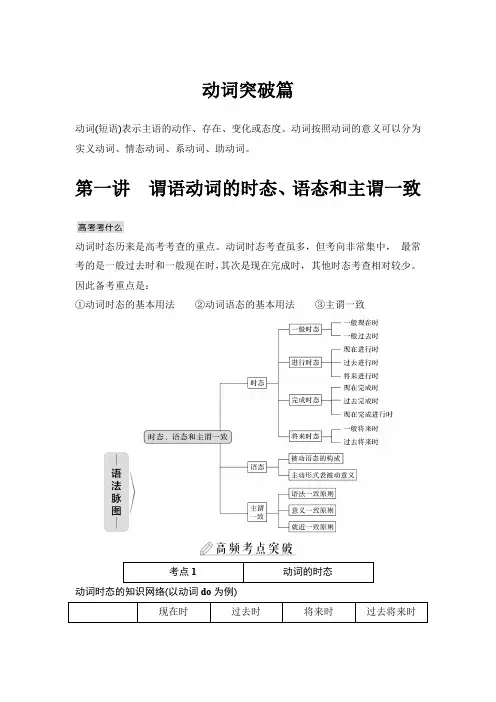
动词突破篇动词(短语)表示主语的动作、存在、变化或态度。
动词按照动词的意义可以分为实义动词、情态动词、系动词、助动词。
第一讲谓语动词的时态、语态和主谓一致动词时态历来是高考考查的重点。
动词时态考查虽多,但考向非常集中,最常考的是一般过去时和一般现在时,其次是现在完成时,其他时态考查相对较少。
因此备考重点是:①动词时态的基本用法②动词语态的基本用法③主谓一致动词时态的知识网络(以动词do为例)1.一般时态(1)一般现在时①表示经常或习惯性的动作,多用动作动词,且常与表频率的时间状语连用。
We have meals three times a day.我们一日吃三餐。
②表示客观真理、科学事实及自然现象。
The sun sets in the west.太阳从西方落下。
③在时间、条件状语从句中常用一般现在时代替一般将来时。
I’ll write to her when I have time.有时间我会写信给她。
(2)一般过去时①表示过去发生的一次性或习惯性动作或状态。
We often played basketball together.我们(过去)经常在一起打篮球。
②时间、条件、让步状语从句中,若主句用了过去将来时,从句常用一般过去时。
He said he would tell her the news as soon as he met her.他说他一见到她就把这个消息告诉她。
单句语法填空①The 80,000 objects collected by Sir Hans Sloane, for example, formed (form) the core collection of the British Museum which/that opened in 1759.(2020·新高考卷Ⅰ语法填空)②The unmanned Chang’e-4 probe (探测器)—the name was inspired by an ancient Chinese moon goddess—touched (touch) down last week in the South Pole-Aitken basin.(2020·全国卷Ⅰ语法填空)③When/As he asked the villagers on the banks of the river where he could find the legendary (传奇的) artist, they smiled and pointed (point) down the river.(2020·全国卷Ⅲ语法填空)④New methods meant__(mean)that fewer people worked in farming.(2020·浙江卷语法填空)⑤While running regularly can’t make you live forever,the review says it is(be) more effective at lengthening life than walking,cycling or swimming.(2018·全国卷Ⅰ语法填空)⑥Sarah says,“My dad thinks I should take the offer now.But at the moment,school comes (come) first.I don’t want to get too absorbed in modeling.”(全国卷Ⅲ语法填空)2.进行时态(1)现在进行时(am/is/are+现在分词)①表示说话时正在进行或发生的动作,也可表示现阶段正在进行的动作或存在的状态。
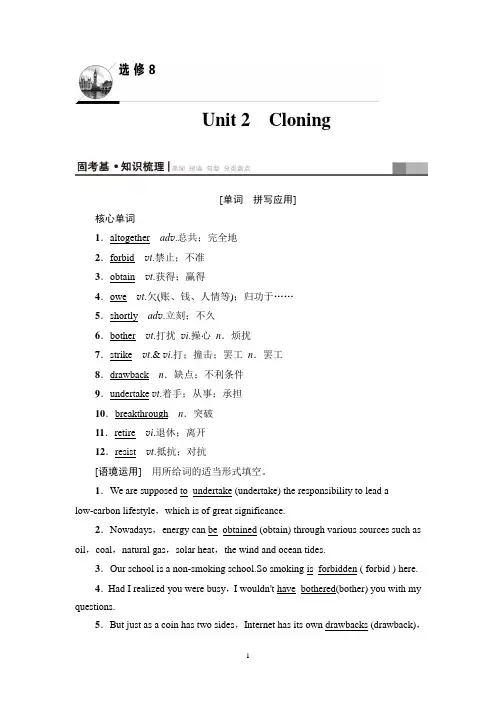
Unit 2Cloning[单词拼写应用]核心单词1.altogether ad v.总共;完全地2.forbid v t.禁止;不准3.obtain v t.获得;赢得4.owe v t.欠(账、钱、人情等);归功于……5.shortly ad v.立刻;不久6.bother v t.打扰v i.操心n.烦扰7.strike v t.& v i.打;撞击;罢工n.罢工8.drawback n.缺点;不利条件9.undertake v t.着手;从事;承担10.breakthrough n.突破11.retire v i.退休;离开12.resist v t.抵抗;对抗[语境运用]用所给词的适当形式填空。
1.We are supposed to_undertake (undertake) the responsibility to lead alow-carbon lifestyle,which is of great significance.2.Nowadays,energy can be_obtained (obtain) through various sources such as oil,coal,natural gas,solar heat,the wind and ocean tides.3.Our school is a non-smoking school.So smoking is_forbidden ( forbid ) here.4.Had I realized you were busy,I wouldn't have_bothered(bother) you with my questions.5.But just as a coin has two sides,Internet has its own drawbacks (drawback),which should not be neglected.6.Having_retired(retire) from business,he now occupies himself with his garden.拓展单词1.differ v i.不同;相异→different adj.不同的→difference n.差异;不同2.complicate v t.使复杂化→complicated adj.复杂的;难懂的→complication n.复杂3.correct adj.正确的v.改正→correction n.改正;纠正;修正4.object v i.反对;不赞成→objection n.不赞成;反对;异议5.accumulate v t.& v i.积累;聚积→accumulation n.积累;增加6.assume v t.假定;设想→assumption n.假定;设想7.popular adj.流行的;通俗的;受欢迎的→popularity n.受人喜爱;流行8.decorate v.装饰;装修→decoration n.装饰;装修9.reason n.原因;道理→reasonable adj.合情理的;讲道理的;公道的10.exact adj.精确的;准确的→exactly ad v.精确地;准确地[语境运用]用所给词的适当形式填空。
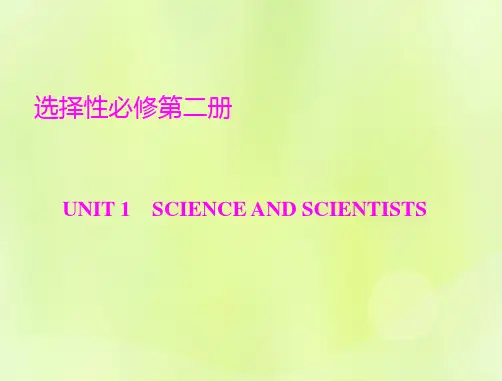
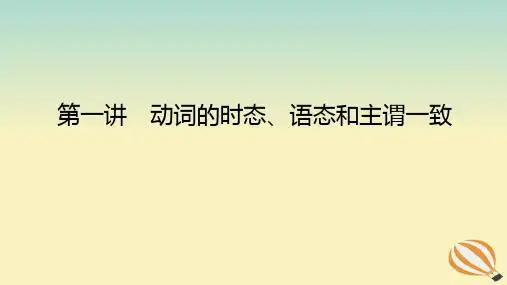
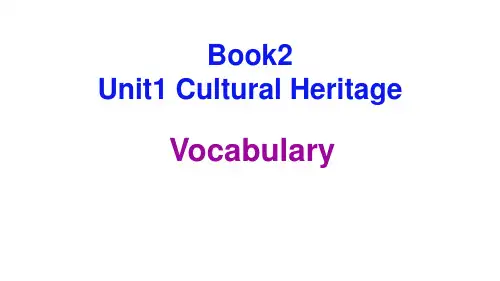
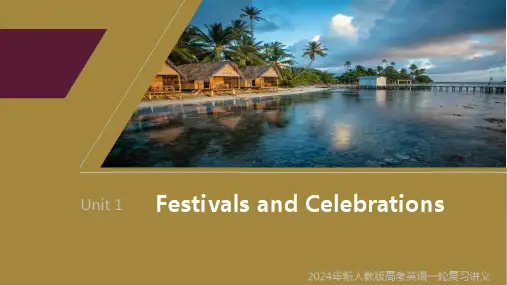
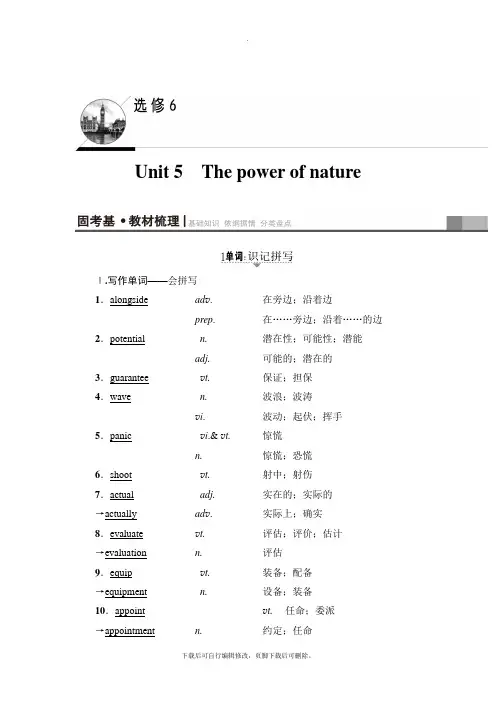
Unit 5The power of natureⅠ.写作单词——会拼写1.alongside ad v. 在旁边;沿着边prep. 在……旁边;沿着……的边2.potential n. 潜在性;可能性;潜能adj.可能的;潜在的3.guarantee v t.保证;担保4.wave n. 波浪;波涛v i. 波动;起伏;挥手5.panic v i.&v t.惊慌n. 惊慌;恐慌6.shoot v t.射中;射伤7.actual adj.实在的;实际的→actually ad v. 实际上;确实8.evaluate v t.评估;评价;估计→evaluation n. 评估9.equip v t.装备;配备→equipment n. 设备;装备10.appoint v t.任命;委派→appointment n. 约定;任命11.appreciate v t.欣赏;感谢→appreciation n. 欣赏;感谢;感谢12.suit n. 一套外衣;套装v t.适合;使适宜→suitable adj.适宜的13.absolute adj.绝对的;完全的→absolutely ad v. 绝对地;完全地14.anxious adj.忧虑的;不安的→anxiously ad v. 不安地→anxiety n. 担忧;焦虑;渴望15.unconscious adj.失去知觉的;未发觉的→conscious adj.(反义词)有知觉的,有意识的→consciously ad v. 有意识地Ⅱ.阅读单词——要识记16.volcano n.火山17.diverse adj.多种多样的;不同的18.precious adj.贵重的;珍贵的19.tremble v i. 摇晃;摇动;颤抖20.fountain n. 喷泉;源泉21.candidate n. 候选人;候补者22.sweat n. 汗v i. 出汗高频短语——会默写1.be suitable for 适合……2.be appointed as 被任命为……3.be anxious about 因……而焦虑4.vary from...to... 由……到……不等5.make one's way 前往6.burn to the ground 全部焚毁7.be home to ……的发源地8.glance through 匆匆看一遍9.have a gift for 有……天赋10.give birth to 产生;生产教材原句——会背诵句式仿写——能应用1.I was about to go back to sleep when suddenly my bedroom became as bright as day.(be about to do...when...正要……这时……) 1.我正要去你家帮助你学英语,这时我叔叔来了。
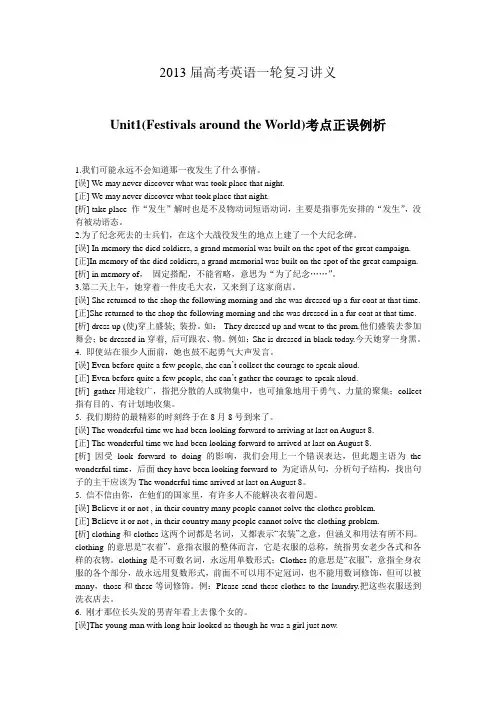
2013届高考英语一轮复习讲义Unit1(Festivals around the World)考点正误例析1.我们可能永远不会知道那一夜发生了什么事情。
[误] We may never discover what was took place that night.[正] We may never discover what took place that night.[析] take place 作“发生”解时也是不及物动词短语动词,主要是指事先安排的“发生”,没有被动语态。
2.为了纪念死去的士兵们,在这个大战役发生的地点上建了一个大纪念碑。
[误] In memory the died soldiers, a grand memorial was built on the spot of the great campaign. [正]In memory of the died soldiers, a grand memorial was built on the spot of the great campaign. [析] in memory of,固定搭配,不能省略,意思为“为了纪念……”。
3.第二天上午,她穿着一件皮毛大衣,又来到了这家商店。
[误] She returned to the shop the following morning and she was dressed up a fur coat at that time. [正]She returned to the shop the following morning and she was dressed in a fur coat at that time. [析] dress up (使)穿上盛装; 装扮。
如:They dressed up and went to the prom.他们盛装去参加舞会;be dressed in穿着, 后可跟衣、物。
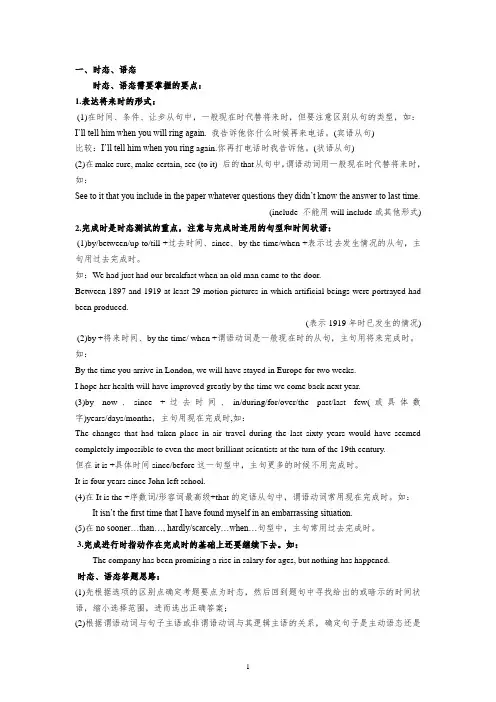
一、时态、语态时态、语态需要掌握的要点:1.表达将来时的形式:(1)在时间、条件、让步从句中,一般现在时代替将来时,但要注意区别从句的类型,如:I’ll tell him when you will ring again. 我告诉他你什么时候再来电话。
(宾语从句)比较:I’ll tell him when you ring again.你再打电话时我告诉他。
(状语从句)(2)在make sure, make certain, see (to it) 后的that从句中,谓语动词用一般现在时代替将来时,如:See to it that you include in the paper whatever questions they didn’t know the answer to last time.(include 不能用will include或其他形式) 2.完成时是时态测试的重点,注意与完成时连用的句型和时间状语:(1)by/between/up to/till +过去时间、since、by the time/when +表示过去发生情况的从句,主句用过去完成时。
如:We had just had our breakfast when an old man came to the door.Between 1897 and 1919 at least 29 motion pictures in which artificial beings were portrayed had been produced.(表示1919年时已发生的情况) (2)by +将来时间、by the time/ when +谓语动词是一般现在时的从句,主句用将来完成时。
如:By the time you arrive in London, we will have stayed in Europe for two weeks.I hope her health will have improved greatly by the time we come back next year.(3)by now、since +过去时间、in/during/for/over/the past/last few(或具体数字)years/days/months,主句用现在完成时,如:The changes that had taken place in air travel during the last sixty years would have seemed completely impossible to even the most brilliant scientists at the turn of the 19th century.但在it is +具体时间since/before这一句型中,主句更多的时候不用完成时。
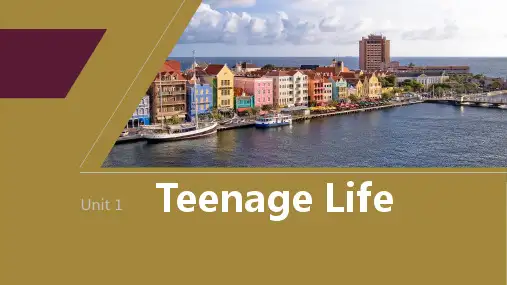
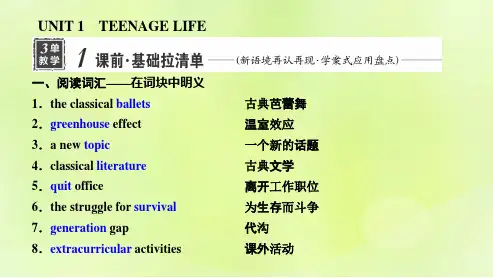
高考英语一轮复习重点句型归纳+对点训练1.while/when状语从句的省略。
例句:While walking the dog, you were careless and it got loose and was hit by a car.在遛狗的时候,你不小心松了手,结果它被一辆汽车撞了。
即学即练1:出去散步的时候,你应该随身带一个小垃圾袋。
While_going_for_a_walk,_you should take along a small garbage bag.即学即练2:Water turns into vapour when it is heated.→改成省略句:Water turns into vapour when heated.即学即练3:(单句语法填空)When_____asked_______(ask)why he was late, he kept silent.I fell asleep while___watching______________(watch)TV.2. be doing/ be about to do/be on the point of doing / had done…, when…(when:这时, 强调一个动作的突然发生)1). I was walking along the river, when I heard a drowning boy cry for help.2). I was about to leave when it began to rain.3). I had just finished my test paper when the bell rang, announcing the exam was over.即学即练1.:我刚刚坐下来工作就听到有人在敲门。
I had_just_sat_down_to_work_when I heard someone knocking at the door.即学即练2. 我们正在看电视,这时候妈妈进来了。
Unit 1 Science FictionⅠ. 词块记单词1. with dignity 有尊严地;彬彬有礼2. a big salary 高工资3. dismiss Tony 解雇托尼,让托尼离开4. on a daily or weekly basis 每天或每周5. chairwoman of the student union 学生会女主席6. become superior 变得更好7. fetch something 去拿东西8. my pace grows faster 我的速度变得更快9. look at the random things看看这些随机闪现的东西10. at maximum speed 以最高的速度11. admire one's wisdom and integrity 钦佩某人的智慧和正直。
12. suspend from the ceiling 吊在天花板上Ⅱ. 语境记单词1. He was appointed as headmaster and wanted to tell his girlfriend the good news at the appointed time, but she missed their appointment somehow. (appoint)2. I'd like to carry less guilt around constantly. I always feel guilty for no reason. (guilt)3. The people in the colonies declared that they would form their own state and finally signed a declaration of independence. (declare)4. She calculated the total number using the calculator and it took her two hours to complete the calculation. (calculate)5. She divided the apples among the kids and the division was quite fair. (divide)6. Realising there was an urgent need for food, water and medicine in the disaster area and the urgency of making everything return to normal, the government took measures immediately to deal with the serious situation. (urge)7. A bomb exploded in the centre of the city and the explosion killed more than 100 people. (explode)Ⅲ. 语境记短语1. They opened a single sportswear store in Europe to test out (检验) the market.2. Task reports are submitted by developers on a weekly basis (以周为单位).3. The house fell away (消失) as we left the city.4. Even the students who used to dislike English have turned out (结果是) to be interested in the subject.5. Their opinion on the accident conflicted with (与……冲突) ours.6. Alan took over (接管) the farm when his father died.7. The couple consider themselves superior to (优于) most other people, although they may not say so.8. We have an urge to (有强烈的欲望) give advice immediately to make the person feel better or try to fix the problem.9. The opening speeches sounded more like (更像是) declarations of war than offerings of peace.10. Anne looks at the pros and cons (事物的利与弊) of making changes to your property.Ⅳ. 公式练句型1. 这位老年人走路好像醉了似的。